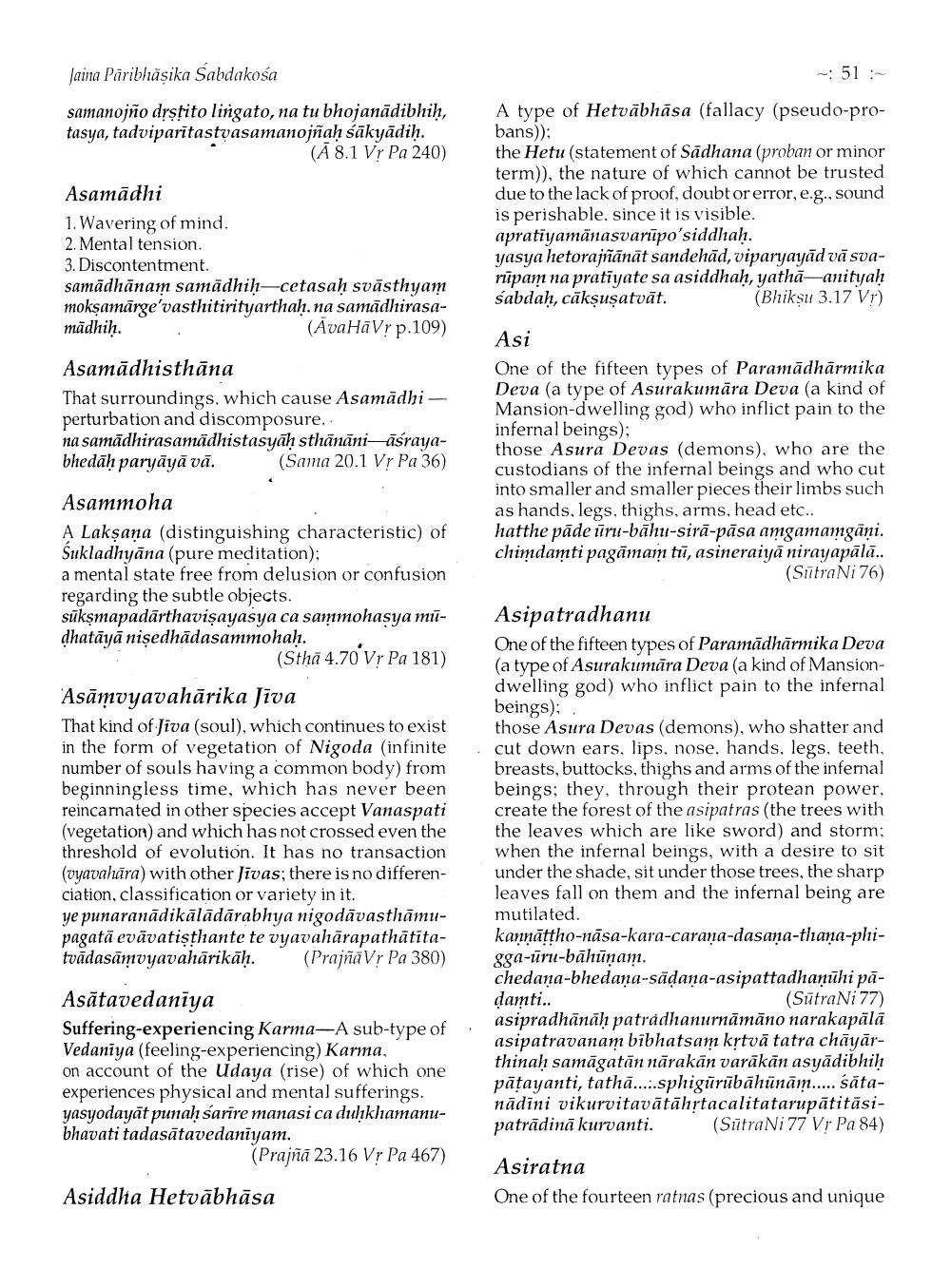________________
Jaina Pāribhāşika Sabdakosa
- 51 :
samanojno drstito lingato, na tu bhojanādibhih, tasya, tadviparītastvasamanojñaḥ sākyādih.
(Ā 8.1 Vr Pa 240)
Asamādhi 1. Wavering of mind. 2. Mental tension. 3. Discontentment. samādhānam samādhill-cetasal soặstham mokşamārge'vasthitirityarthah. na samadhirasamādhiḥ.
(AvaHaV; p.109)
A type of Hetvābhāsa (fallacy (pseudo-probans)); the Hetu (statement of Sadhana (proban or minor term)), the nature of which cannot be trusted due to the lack of proof, doubt or error, e.g., sound is perishable, since it is visible. apratiyamānasvarīpo'siddhah. yasya hetorajñānāt sandehād, viparyayād vā svaripam na pratiyate sa asiddhah, yathā-anityah sabdaḥ, cākṣușatvāt. (Bhiksu 3.17 Vr)
m
.
Asamādhisthāna That surroundings, which cause Asamādhi - perturbation and discomposure. na samādhirasamādhistasyāh sthānāni asrayabhedah pariyaya ข. (Sama 20.1 Vr Pa 36)
Asi One of the fifteen types of Paramādhārmika Deva (a type of Asurakumāra Deva (a kind of Mansion-dwelling god) who inflict pain to the infernal beings); those Asura Devas (demons), who are the custodians of the infernal beings and who cut into smaller and smaller pieces their limbs such as hands, legs, thighs, arms, head etc.. hatthe pāde uru-bāhu-sirā-pāsa amgamamgāni. chimdamti pagāmam tū, asineraiyā nirayapālā..
(Siītra Ni 76)
Asipatradhanu One of the fifteen types of Paramādhārmika Deva (a type of Asurakumāra Deva (a kind of Mansiondwelling god) who inflict pain to the infernal
beings);
Asammoha A Lakşaņa (distinguishing characteristic) of Sukladhyāna (pure meditation); a mental state free from delusion or confusion regarding the subtle objects. sūkşmapadārthavișayasya ca sammohasya midhatāyā nişedhādasammohah.
(Sthā 4.70'Vr Pa 181) Asāmvyavahārika Jiva That kind of Jiva (soul), which continues to exist in the form of vegetation of Nigoda infinite number of souls having a common body) from beginningless time, which has never been reincarnated in other species accept Vanaspati (vegetation) and which has not crossed even the threshold of evolution. It has no transaction (vyavahāra) with other Jivas; there is no differenciation, classification or variety in it. ye punaranādikālādārabhya nigodāvasthāmupagatā evävatişthante te vyavahārapathātitatvādasāmvyavahārikāḥ. (Prajna Vr Pa 380)
those Asura Devas (demons), who shatter and cut down ears, lips, nose, hands, legs, teeth, breasts, buttocks, thighs and arms of the infernal beings; they, through their protean power, create the forest of the asipatras (the trees with the leaves which are like sword) and storm; when the infernal beings, with a desire to sit under the shade, sit under those trees, the sharp leaves fall on them and the infernal being are mutilated. kannāttho-nāsa-kara-carana-dasana-thana-phigga-ūru-bāhūnam. chedaņa-bhedana-sādana-asipattadhanūhi pādamti..
(SūtraNi 77) asipradhānāh patrådhanurnāmāno narakapālā asipatravanam bibhatsam krtvā tatra chāyārthinaḥ samāgatan nārakān varākān asyādibhih pāțayanti, tathā.....sphigūrübähünām..... sātanādini vikurvitavātährtacalitatarupätitäsipatrādinā kurvanti. (SutraNi 77 Vr Pa 84)
Asātavedaniya Suffering-experiencing Karma—A sub-type of. Vedaniya (feeling-experiencing) Karma, on account of the Udaya (rise) of which one experiences physical and mental sufferings. yasyodayāt punah sarire manasi ca duhklamanubhavati tadasātavedaniyam.
(Prajna 23.16 Vr Pa 467)
Asiddha Hetvābhāsa
Asiratna One of the fourteen ratnas (precious and unique




